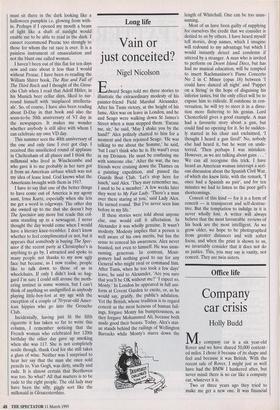Long life
Vain or just conceited?
Nigel Nicolson
E
dward Seago told me three stories to illustrate the extraordinary modesty of his painter-friend Field Marshal Alexander. After his Tunis victory, at the height of his fame, Alex was on leave in London, and he and Seago were walking down St James's Street when a man stopped them. 'Excuse me, sir,' he said, 'May I shake you by the hand?' Alex politely chatted to him for a moment and then rejoined Seago. 'He was talking to me about the Somme,' he said, `but I can't think who he is. He wasn't even in my Division. He must be confusing me with someone else.' After the war, the two friends were cruising down the Thames on a painting expedition, and passed the Guards Boat Club. 'Let's stop here for lunch,' said Alex. 'They may remember me, I used to be a member.' A few weeks later they went to My Fair Lady. 'There's a man over there staring at you,' said Lady Alex. He turned round. 'But I've never seen him before in my life.' If these stories were told about anyone else, one would call it affectation. In Alexander it was wholly genuine. It wasn't modesty. Modesty implies that a person is well aware of his own merits, but has the sense to conceal his awareness. Alex never boasted, not even to himself. He was unas- suming, generous. In contrast, Mont- gomery had nothing good to say for any General who might rival or command him. After Tunis, when he too took a few days' leave, he said to Alexander, 'Are you sure that you'll be OK without me?' I expect so, Monty.' In London he appeared in full uni- form at Covent Garden to excite, or, as he would say, gratify, the public's adulation. Yet the British, whose tradition is to regard conceit as the most heinous of human fail- ings, forgave Monty his bumptiousness, as they forgave Mohammed Ali, because both made good their boasts. Today, Alex's stat- ue stands behind the railings of Wellington Barracks while Monty's stares down the length of Whitehall. One can be too unas- suming.
Most of us have been guilty of supplying for ourselves the credit that we consider is denied to us by others. I have heard myself tell stories, drop names, which I imagine will redound to my advantage but which I would instantly detect and condemn if uttered by a stranger. A man who is invited to perform on Desert Island Discs, but has had no musical education, will be tempted to insert Rachmaninov's Piano Concerto No 2 in C Minor (opus 18) between 'I could have danced all night' and 'Puppet on a String' in the hope of disguising his inferior tastes, but the only effect will be to expose him to ridicule. If outshone in con- versation, he will try to steer it in a direc- tion more flattering to his genius. Lord Chesterfield gives a good example. A man had a favourite story about a gun, but could find no opening for it. So he sudden- ly started in his chair and exclaimed, 'I thought I heard a gun fired!' No, nobody else had heard it, but he went on unde- terred, 'Then perhaps I was mistaken. However, as we are talking about guns . . . ' We can all recognise this trick. I have heard an American woman interrupt a seri- ous discussion about the Spanish Civil War, of which she knew little, with the remark, 'I once had a Spanish au pair', and for ten minutes we had to listen to the poor girl's shortcomings.
Conceit of this kind — for it is a form of conceit — is transparent and self-destruc- tive. But the temptation to indulge in it is never wholly lost. A writer will always believe that the most favourable reviews of his book are the most intelligent. As we grow older, we hope to be photographed from greater distances and with softer focus, and when the print is shown to us, we invariably consider that it does not do us justice. This, you may say is vanity, not conceit. They are twin sisters.


























































 Previous page
Previous page